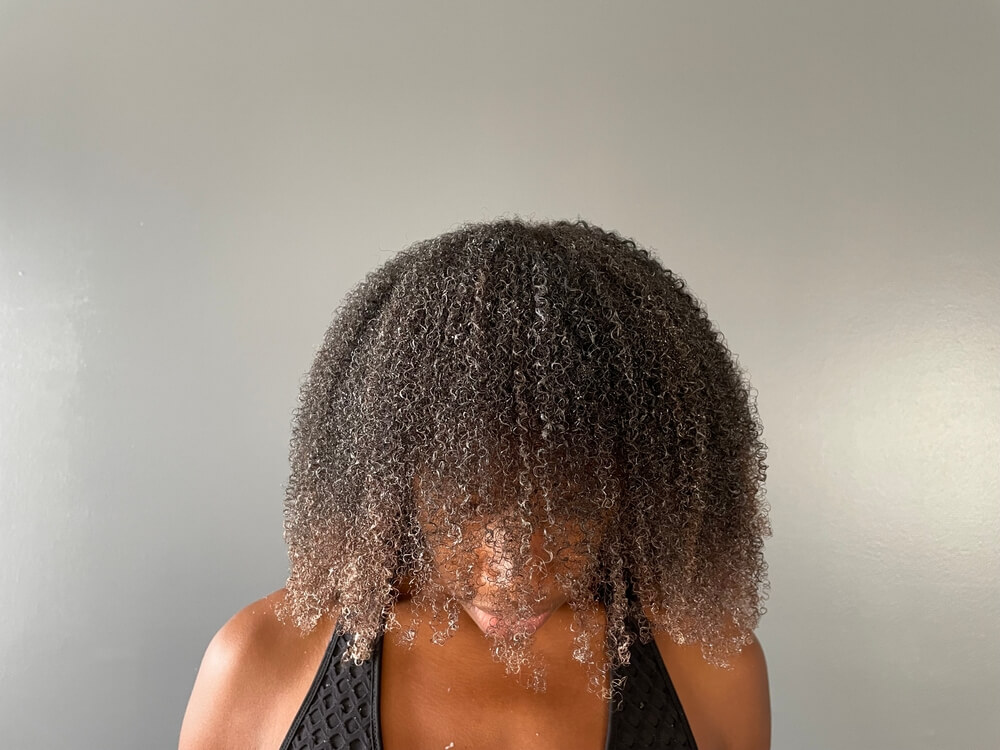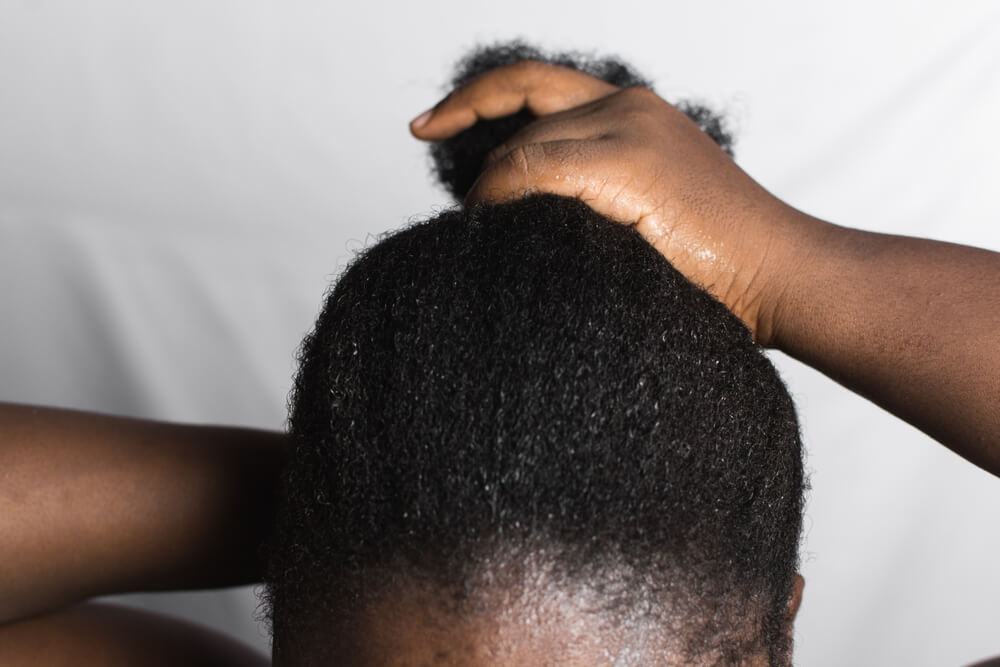
Embracing 4C hair, known for its tight curls and zig-zag pattern, is essential. It can shrink up to 75% when dry. Andre Walker’s early 2000s classification popularized 4C hair care, which includes deep conditioning, protective styling, and oil-rich products to maintain moisture and reduce breakage. Understanding these needs nurtures curls and heritage confidently.
What is 4C Hair?
4C hair is a unique and beautiful natural hair type that falls under the category of coily textures. But what exactly is 4C hair? This specific hair type is characterized by its tight, zig-zag curls that can be prone to dryness and shrinkage. Unlike other natural hair types, 4C hair often has no defined curl pattern without styling or manipulation.
The texture of 4C hair can vary from fine and soft to coarse and wiry, making it incredibly versatile but also requiring special care. It tends to be more fragile than other natural hair types due to its tight coils, which means it can easily break if not handled with care.
Understanding your 4C hair texture is crucial for proper maintenance. Moisture retention is key; using products designed specifically for 4C hair can help in keeping the strands hydrated and reducing breakage. Protective styles like braids or twists are also beneficial as they minimize manipulation and help retain length.
In essence, knowing what is 4C hair allows you to embrace your natural beauty while catering to its specific needs. By acknowledging the unique characteristics of the 4C hair type, you can adopt a care routine that enhances its health and showcases its stunning texture.
Characteristics of 4C Hair

4C hair is a unique and beautiful hair type that is often characterized by its tight coils and dense texture. One of the most distinguishing features of 4C hair is its curl pattern, which forms very tight, zigzag curls that can be difficult to see with the naked eye. These curls are typically very small in diameter and can shrink up to 75% of their actual length when dry.
Identifying 4C hair involves looking for specific characteristics such as the tightness of the coils and the overall density. Unlike other curl patterns, 4C hair does not have a defined curl shape but rather a more fluffy appearance due to its tightly packed coils. This type of hair tends to be more fragile than other types because each bend in the strand is a potential breaking point.
Another feature of 4C hair is its versatility; it can be styled in numerous ways, from afros to twist-outs and braids. However, it also requires diligent care and moisture retention strategies because it is prone to dryness. Understanding these characteristics helps in adopting appropriate care routines that enhance the natural beauty of 4C hair while maintaining its health and strength.
The History and Significance of the Term “4C Hair”
The term “4C hair” has become a significant identifier within the natural hair community, but its origins and importance are rooted in both cultural and historical contexts. The classification system that includes 4C hair was popularized by hairstylist Andre Walker, who created a hair typing system to help individuals understand and care for their natural hair textures. In this system, type 4 hair is characterized by tightly coiled curls, with 4C being the most densely packed and coily texture.
Understanding the origin of the term “4C hair” is crucial for appreciating its role in the broader conversation about natural hair. Historically, natural Black hair has been subjected to societal pressures that favored Eurocentric beauty standards, often leading to stigmatization and marginalization of those with tightly coiled textures. The emergence of terms like “4C” provides a framework for recognizing and celebrating the diversity within Black hair types.
Moreover, comprehending the historical context of natural hair types highlights their cultural significance. For many individuals with 4C hair, embracing their natural texture is an act of self-acceptance and resistance against historical norms that devalued their beauty. This understanding fosters a deeper appreciation for the unique qualities of 4C hair and underscores the importance of promoting inclusivity within beauty standards.
In summary, the term “4C hair” is more than just a classification; it carries historical weight and cultural significance. By acknowledging its origin and understanding its importance, we can better appreciate the diversity within natural hair types and support a more inclusive approach to beauty.
Caring for Your 4C Hair
4C hair, known for its tight curls and coarse texture, requires a specialized care routine to maintain its health and beauty. Here are some essential tips to help you manage your 4C hair effectively.
Moisturizing Tips for 4C Hair
Keeping 4C hair moisturized is crucial due to its natural tendency to dryness. Incorporate a deep conditioning treatment into your routine at least once a week. Use products rich in natural oils like coconut oil, shea butter, or avocado oil to lock in moisture. Additionally, the LOC method (Liquid-Oil-Cream) can be highly beneficial in maintaining hydration levels throughout the day.
Detangling Techniques for Curly Hair
Detangling 4C hair can be challenging but using the right techniques can make it easier. Always detangle your hair when it is wet and saturated with conditioner or a detangling spray. Use a wide-tooth comb or your fingers to gently work through knots from the ends towards the roots. Patience is key; rushing through this process can lead to breakage.
Protective Styles for Natural Hair
Protective styles are excellent for minimizing manipulation and reducing breakage in 4C hair. Styles like braids, twists, bantu knots, or even wigs can protect your hair from daily wear and tear while promoting growth. Ensure that these styles are not too tight to avoid tension on your scalp which could lead to traction alopecia.
Daily Care Routine for Coily Hair
A consistent daily care routine will keep your 4C hair healthy and manageable. Start with spritzing water or a water-based leave-in conditioner each morning to refresh curls and add moisture. Seal this moisture with an oil of your choice. At night, cover your hair with a satin bonnet or sleep on a satin pillowcase to reduce friction that causes breakage.
By following these best practices and tips tailored specifically for 4C hair, you can maintain healthy, hydrated curls that look beautiful every day.
The Best Products for Maintaining Healthy 4C Hair
Maintaining healthy 4C hair requires a specialized approach, given its unique texture and needs. To achieve optimal results, it’s essential to use the best products specifically designed for coily hair. Below are some top recommendations for shampoos, conditioners, leave-in treatments, and oils that cater to natural curls.
Shampoos and Conditioners
When it comes to cleansing 4C hair, selecting the right shampoo is crucial. Look for sulfate-free options that gently cleanse without stripping away natural oils. Recommended shampoos for natural curls include products like Shea Moisture’s Raw Shea Butter Moisture Retention Shampoo and As I Am Curl Clarity Shampoo.
Conditioning is equally important in maintaining moisture levels and detangling coily hair. Deep conditioning treatments such as TGIN Honey Miracle Hair Mask and Mielle Organics Babassu Oil & Mint Deep Conditioner are excellent choices. These conditioners penetrate deeply into the hair shaft, providing much-needed hydration and nourishment.
Leave-In Conditioners
Leave-in conditioners play a vital role in keeping 4C hair moisturized throughout the day. They help in detangling while also providing an extra layer of protection against environmental stressors. Some highly recommended leave-in conditioners for curly textures include Kinky-Curly Knot Today Leave-In Conditioner/Detangler and Aunt Jackie’s Quench Moisture Intensive Leave-In Conditioner.
Oils
Oils are essential in sealing moisture into 4C hair strands and adding shine without weighing them down. Natural oils such as Jamaican Black Castor Oil, Argan Oil, and Coconut Oil work wonders when applied to damp or dry hair. Products like Tropic Isle Living Jamaican Black Castor Oil or The Mane Choice Multi-Vitamin Scalp Nourishing Growth Oil can help maintain healthy scalp conditions while promoting overall hair health.
By incorporating these best products for coily hair into your routine, you can achieve healthier, more manageable 4C curls.
Common Challenges Faced by People with 4C Hair and How to Overcome Them
4C hair, characterized by its tight coils and dense texture, is both beautiful and unique. However, those with 4C hair often face specific challenges that can make hair care a bit more complicated. Understanding these challenges and learning how to address them can help maintain healthy, vibrant curls.
One of the primary challenges with managing coily textures is breakage. The tightly coiled structure of 4C hair makes it more susceptible to breakage, especially when it’s dry or handled roughly. To prevent breakage, it’s essential to use gentle handling techniques. This includes detangling with a wide-tooth comb or fingers while the hair is wet and saturated with conditioner. Regular trims are also crucial for removing split ends before they can travel up the hair shaft.
Another common issue is combating dryness in curly hairstyles. Due to the natural twists and turns of 4C strands, sebum (the scalp’s natural oil) has a harder time traveling down the length of the hair, leading to dryness. To keep your coils moisturized, incorporate deep conditioning treatments into your routine at least once a week. Additionally, using leave-in conditioners and sealing in moisture with natural oils like jojoba or coconut oil can make a significant difference.
By understanding these common challenges and implementing effective strategies such as breakage prevention tips and moisture retention techniques, individuals with 4C hair can maintain their curls’ health and vitality while embracing their natural beauty.
Embracing the Beauty of Your Natural Curls
In recent years, there has been a significant shift towards embracing natural beauty standards, particularly when it comes to hair. This movement is not just about aesthetics; it is deeply rooted in cultural significance and positive representation in media. For many Black individuals, natural curls are more than a hairstyle—they are a celebration of heritage and identity.
The cultural significance of Black hairstyles cannot be overstated. From braids to afros, these styles have historical roots that date back centuries and hold profound meaning within various African cultures. They tell stories of lineage, social status, and even personal beliefs. By embracing natural curls, individuals are honoring these rich traditions and asserting their pride in their cultural heritage.
Positive representation in media plays a crucial role in this movement. When celebrities, influencers, and everyday people proudly showcase their natural curls on television, social media platforms, and magazines, it helps to normalize these beauty standards. It sends a powerful message that all hair types are beautiful and worthy of celebration.
Embracing the beauty of your natural curls is an act of self-love and cultural affirmation. It challenges outdated notions of beauty that have long favored Eurocentric standards over diverse expressions of identity. As more people continue to embrace their natural hair textures, they contribute to a broader societal shift towards inclusivity and respect for all forms of beauty.
The movement towards embracing natural curls is not just about fashion, it’s about reclaiming identity and promoting positive cultural representation. By celebrating the unique beauty inherent in Black hairstyles, we take important steps toward fostering a more inclusive understanding of what it means to be beautiful.
Celebrating Your Unique Texture with Confidence and Care
As we reach the conclusion of our journey through understanding and embracing your unique hair texture, it’s essential to celebrate the individuality that sets you apart. Each strand of hair tells a story, reflecting your heritage, personality, and beauty. Embracing your natural texture is not just about aesthetics; it’s a powerful statement of self-acceptance and confidence.
Caring for your hair with the right products and techniques ensures it remains healthy and vibrant. Whether you have curly, straight, wavy, or coily hair, understanding its needs allows you to showcase its full potential. Regular moisturizing, gentle handling, and protective styles can all contribute to maintaining the health of your locks.
Confidence in your natural texture comes from knowledge and care. By educating yourself about what works best for your hair type and investing time in proper maintenance routines, you can enhance its beauty while staying true to yourself. Celebrate every wave, curl, kink, or sleek strand with pride, because there is nothing more beautiful than being authentically you.
In summary, embracing your unique texture with confidence involves understanding its needs and providing it with the care it deserves. Let every day be an opportunity to flaunt what makes you uniquely beautiful.



